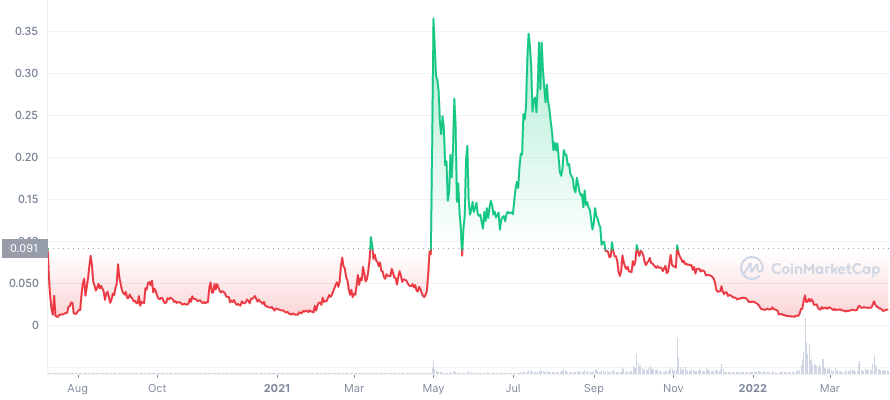OpenGuild Finance wants to become the capital market for the open metaverse

Pic: Stevica Mrdja / EyeEm / EyeEm via Getty Images
Play-to-earn gaming guilds are one of the hottest sectors in the crypto space, with at least four founded by Australians in the last year alone.
Many others exist globally, including Yield Guild Games, Merit Circle and Avacado DAO. Now crypto organisations are emerging to support them.
Aussie co-founded OpenGuild Finance is a financing protocol for gaming guilds, offering investors astronomical yields for providing capital to guilds looking to expand their operations.
The platform is currently in closed alpha after raising US$3.6 million last year at a $50 million valuation, with investors that include Polychain Capital, Dragonfly Capital, Robot Ventures, Mycelium and founders from Sky Mavis, Maple Finance, Ribbon Finance and Zerion.
“We as OpenGuild see an opportunity in defining what play-to-earn gaming is going to be,” OpenGuild Finance’s Sydney-based co-founder Shavin Wijeyaratne told Stockhead over coffee last month, who added that OpenGuild hadn’t even intended to raise money when it began.
Wijeyaratne co-founded OpenGuild last year with Americans Kedian Sun and David Lee. It currently has a team of five, and is looking to hire three more engineers and a designer.
The project aim allow regular investors to tap into the sky-high yields offered by crypto gaming, without the hassle of running a guild or bothering to play the game.
“We’re like, you can put money into this pool, your managers will use that money and go earn a return by lending those assets to the scholars. And then they’ll share that revenue back with investors,” Wijeyaratne said.
The major guilds like YGG and Merit Circle have raised immense amounts of capital, but fundraising is a problem for the other 99 per cent of guilds, he said.
Raising funds is indeed a massive task P2E guilds should take when they want to expand.
Last Month, @AlamatSquadPH was able to raise $10,000 from 40+ investors.
Today, we are applying for another $10,000 financing through @og_finance.
Wish us luck! #P2E #Pegaxy #Metaverse
— MrNuno (@NunoSaPuntod) March 2, 2022
Last month OpenGuild closed its first play-to-earn pool after raising over US$500,000 in Tether from 80 participants, nearly two-thirds of whom contributed less than US$1,000. There was a cap of US$50,000.
That pool is focused on guilds participating in the mythological horseracing game Pegaxy (Pegasus Galaxy), where the yields on offer look to be around 1,000 per cent, Wijeyaratne said.
“We don’t expect that to stay like that forever,” he said. “But I think the idea is, even if this game sustains for two months or so, people get their principal back very quickly, and then the rest is sort of gravy on top.”
There hasn’t been much too much public analysis in the play-to-earn space about what strategies are the best from an earnings perspective, Wijeyaratne said.
“Fundamentally, this is very financial stuff. We’ve had gaming before, but what’s really different about this is ownership, real ownership by users, but I think there is this very real financial layer that is driving this initial wave of adoption,” Wijeyaratne said.
Borrowers voted in
While many pools of capital in the crypto space are permissionless because they’re backed by collateral, this isn’t how OpenGuild’s work.
Borrowers must be whitelisted, pass KYC (know-your-customer) and the guild manager must sign legal documents.
For the newest pools that OpenGuild is launching next week, the guilds will be selected by the community via voting.
“Given the trust-based nature of the pools, it is important to minimise the risk of rug pulls,” OpenGuild said in a Twitter thread.
“The rationale is that guilds with a reputation to protect are much less likely to rug pull and the ability to get votes (whether from their own community or the broader crypto gaming community) is a strong signal for reputation,” it continued.
We believe this proof of social capital is just as good as, if not better than, a centralized entity making an assessment of a guild’s trustworthiness
— OpenGuild Finance (@og_finance) April 13, 2022
Investors deposit Tether into the pools and in return receive “warrant tokens” representing a share of ownership from the pool, and receive capital back from investors in the form of dividends. The warrant tokens can be sold on secondary markets.
The evolution of play to earn gaming
When play-to-earn gaming exploded onto the crypto scene in the second half of last year with the rise of Axie Infinity, there were a lot of narratives around how crypto gaming could provide jobs for people in developing countries, Wijeyaratne explained.
People were saying “this can be their full-time work, it touches on all these ideas of universal basic income,” he said.
Venture capitalists were encouraging people to donate to set up what crypto-gamers refer to as “scholarships,” where people in developing countries are provided with NFTs for earning loot in return for a split of the proceeds. There was a charitable aspect to it, Wijeyaratne said.
But “that narrative is starting to collapse as people realise these economics are not sustainable. You can’t just have people taking money out of the system to pay for their bills and pay for their life, and no money actually coming in,” he said.
Indeed, the price of the Smooth Love Potion used to reward Axie Infinity has gone through a boom and bust cycle.

The new thinking is that crypto-gaming will evolve so that the games are genuinely fun, Wijeyaratne said.
“And there’s there’s sort of a subset of players who are more than happy to put a bunch of money into the game without realising a financial return out of it, and they’ll essentially be subsidising these people who are playing to earn,” he said.
Trying to find a sustainable model
Pegaxy, the first game OpenGuild will be supporting, has a “second-mover advantage” having observed the Axie Infinity’s boom-and-bust cycle, Wijeyaratne said.
“The general gist is that you’re breeding and racing racehorses. You can have two racehorses, breed them together, create new racehorses … and then lend them out to scholars, who will play with them, earn a return et cetra.”
View this post on Instagram
Their model isn’t “super sustainable,” Wijeyaratne admitted, but the developers are trying to find ways to make it moreso by the way Axie’s has been. For example, Pegaxy owners may have to spend tokens to keep their horses alive.
“I think everyone accepts that you can’t, you know, earn 1,000 per cent for the rest of your life, but I think if this volatility is a little less violent, if the boom and the bust is a little more measured, the thinking is this can be a bit more sustained,” Wijeyaratne said.
“You don’t have investors coming in who are just getting absolutely destroyed. And at the same time, you don’t have this sort of overnight fortune kind of things.
“But being early in just about any of these games, the way that crypto works, these overnight fortunes are definitely emerging out of games.”
Before OpenGuild, it just wasn’t possible for retail investors to earn these yields without playing the games themselves, or having a side investment agreement with a guild.
“So we’re essentially just trying to democratise access to these yields,” Wijeyaratne said.
70% of participants in the P2E Yield Pool have deposited less than 1,000 USDT and 19% less than 100 USDT so far
OpenGuild Finance is democratizing access to play-to-earn income
— OpenGuild Finance (@og_finance) March 17, 2022
The future of play-to-earn
Other games that OpenGuild are bullish on are crab battle game Crabada on the Avalanche blockchain, Solana-based starship game Star Atlas and cross-chain game DeFi Kingdoms.
It’s also closely watching Illivum, the crypto game co-founded by Sydney brothers Kieran and Aaron Warwick, as well as Sunflower Farmers, another Australian-founded project, this one on the Polygon network.
Many of these games are moving to reward players with NFTs rather than tokens with “questionable sustainability,” Wijeyaratne said.
“It’s almost like I’m picking up potentially rare art that could dramatically appreciate in value.
“So I think watching how that sort of evolves and how that might effect guild strategies playing these games is going to be quite interesting.”
It’s a fast-moving space and what seemed like a sure path just three months ago is now just not credible, he said.
“The thinking is actually, there are so many issues with these models, we have no idea how it’s going to evolve.
“But our proclamation to the market is, the one thing that’s guaranteed is, there’s going to be a financial layer to all of this. And so that’s where we’re going to build that infrastructure.”
Eventually, Wijeyaratne said, there will be a play-to-earn game that’ll come along and onboard hundreds of millions into crypto, and OpenGuild will be established and ready for it.
The views, information, or opinions expressed in the interview in this article are solely those of the interviewee and do not represent the views of Stockhead.
Stockhead has not provided, endorsed or otherwise assumed responsibility for any financial product advice contained in this article.
For more crypto news, follow the author on Twitter, Stockhead’s crypto-themed Twitter account, and its Facebook page.
Related Topics
UNLOCK INSIGHTS
Discover the untold stories of emerging ASX stocks.
Daily news and expert analysis, it's free to subscribe.
By proceeding, you confirm you understand that we handle personal information in accordance with our Privacy Policy.








